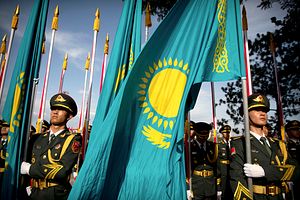Proceedings in the consequential trial of Sayragul Sauytbay in Zharkent, Kazakhstan are now set to continue until at least August 1. Sauytbay, an ethnic Kazakh Chinese citizen, is on trial for illegally crossing the border earlier this year and is at risk of being deported back to China where her lawyer says she is sure to disappear. In open court, Sauytbay has discussed the “re-education” camps in Xinjiang, a “state secret” which Beijing denies the existence of.
According to reporting in the Nikkei Asian Review, the trial was set to finish earlier this week but its conclusion as been delayed to August 1. The slight delay buys Astana a little more time to find a way to manage its difficult position. Caught between the burdens of international relations and a potentially combustible domestic dynamic, there’s no easy outcome.
Sauytbay was arrested on May 21 by Kazakh authorities at Beijing’s behest for illegally crossing the border to join her family — a husband and two children, Kazakh citizens who have been living in Kazakhstan since 2016. According to Nikkei, Chinese authorities had taken Sauytbay’s passport and demanded that she persuade her family to return to China. Instead Sauytbay, who reports cite as a member of the Chinese Communist Party, crossed the border to join her family.
In court on July 13, Sauytbay explained that she had been working in “what is called in China a political camp” since the beginning of 2018. Her husband, Wali Islam, testified that she’d been assigned to the camp from a state kindergarten and that they’d lost contact for several months.
“In fact, it is a prison located in the mountains,” Sauytbay continued. “This political camp is actually a camp for ethnic Kazakhs, and where I worked there were all ethnic Kazakhs. I worked at one such camp and others told me that there were two more.” According to the AFP, “court spectators gasped” when Sauytbay testified that there were 2,500 ethnic Kazakhs in the camp.
Abzal Kuspanov, Sauytbay’s lawyer, told the AFP earlier this month that they were not contesting the fact of the crime but concerned about what will happen if Sauytbay is deported to China. “We are not saying that she has not committed a crime by violating state borders using false documents. We have admitted that to the court and we are prepared to accept punishment,” Kuspanov said. “What we are saying is — don’t give her back to China. If we do send her back, this person will simply disappear.”
According to Nikkei, Sauytbay admitted guilt “and the defense sought a plea bargain to avoid deportation, but the prosecution rejected even the possibility of negotiating.” Sauytbay’s lawyer then submitted a motion citing the 1989 United Nations Convention on the Rights of the Child, and thus extending the trial. In the meantime, Kuspanov has reportedly submitted documents to the U.N. High Commissioner for Refugees office in Almaty in hopes of having Sauytbay declared a political refugee, in hopes this would prevent deportation.
Between a Rock and a Hard Place
In 2013, Astana hosted Chinese President Xi Jinping who unveiled what’s come to known as the Belt and Road Initiative in a speech at Nazarbayev University. In the years since, Kazakhstan has become an important node on the Chinese road to Europe and Kazakh leaders see China is a powerful friend to keep on side.
As I wrote in June, Kazakhstan has tried to carefully chart a course on the Xinjiang issue — especially the matter of ethnic Kazakhs imprisoned in “re-education” camps. Astana has secured the release of some Kazakh citizens without making too much noise about the overarching situation.
But the Sauytbay case — and her testimony airing details of the camps Beijing continues to deny the existence of — has ratched up the pressure on Astana to stand up to Beijing. Nikkei reports that the trial has been well-watched in Kazakhstan, the court “jampacked with activists, public and political figures and ordinary supporters of the woman.”
In interviews with AFP and Nikkei, Kazakh activists and opposition politicians have warned that the trial risks sparking protests, building on already extant anti-Chinese sentiments.
“Sayragul’s case may well trigger large-scale domestic protests,” Amirzhan Kosanov told Nikkei. He also commented that “If the authorities cannot solve Sayragul’s case using all their constitutional, diplomatic and international powers, their domestic reputation will suffer further.”
Serikzhan Mambetalin, a Kazakh political activist, tol AFP earlier this month that if Sauytbay — a member of the wider ethnic Kazakh diaspora — is deported back to China “people will say the government cannot protect its own people.”
Astana’s options are few and boil down to the basic choice between deporting Sauytbay — who would all but assuredly be disappeared into one of the camps she discussed in open court or worse — or not doing so. Perhaps, as the Nikkei article suggested, Kazakhstan is hoping for the international system, namely the U.N. High Commissioner for Refugees in Almaty, will step in to save Sauytbay. International relations may be multifaceted, with Astana’s leaders befuddled by a tangled web of political, economic and social considerations, but the Kazakh public may view the matter more simply: Is Kazakhstan going to choose China over Kazakhs?































